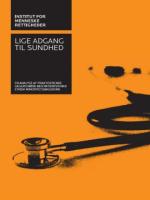
Equal Access To Health
The public health system must be accessible such that all citizens can utilize it on equal terms. This has been established both in Danish law and in human rights provisions. Here we will examine whether (vulnerable) ethnic minority patients face obstacles in obtaining access to appropriate treatment in the health care system, for example, in the form of language and cultural barriers.
The public health system must be accessible such that all citizens can utilize it on equal terms. This has been established both in Danish law and in human rights provisions. Here we will examine whether (vulnerable) ethnic minority patients face obstacles in obtaining access to appropriate treatment in the health care system, for example, in the form of language and cultural barriers.
A review of relevant reports and studies in this field gives the impression that (vulnerable) ethnic minority patients as a group pose a range of challenges to the functioning of the health care system generally. One explanatory model can be that cultural background leads to individual patients acting inappropriately, thus creating the impression of an overly demanding patient group. Another explanatory model is that the health care system is not sufficiently geared to handle the diversity among patients, who have different backgrounds in terms of ethnicity, culture, relationship to religion, inadequate Danish language skills, education, etc.
From a legal perspective, it is relevant to be aware of whether an understanding among health care professionals that a given patient group poses a challenge to the health care system may result in some patients receiving less favorable treatment. In this report, we point to factors which in practice can lead to patients being placed at a disadvantage in their right to health care because of their ethnic origin.
FOCUS ON GENERAL PRACTICE
The report focuses on challenges in general practice in relation to providing all patients with equal access to health care. We chose general practice because general practitioners (GPs) tend to be the patient’s entry port into the health care system’s service offerings and because GPs play a key role in ensuring that everyone, regardless of ethnic origin, obtains the kind and level of treatment that is possible and appropriate.
We analyze the GPs’ encounter with primarily vulnerable patients of non-Western ethnic origin, as we expect that these patients are the most vulnerable in terms of health. At the same time, any experiences they have had with the health care systems in their countries of origin will often be very different from what they encounter in Denmark.
Theanalysis is in Danish, but contains a English summery.
We strive to make the pdf versions of our publications etc. accessible for screen readers. If you experience any problems, please contact Digital Editor Stine Juhl Nielsen on stni@humanrights.dk
